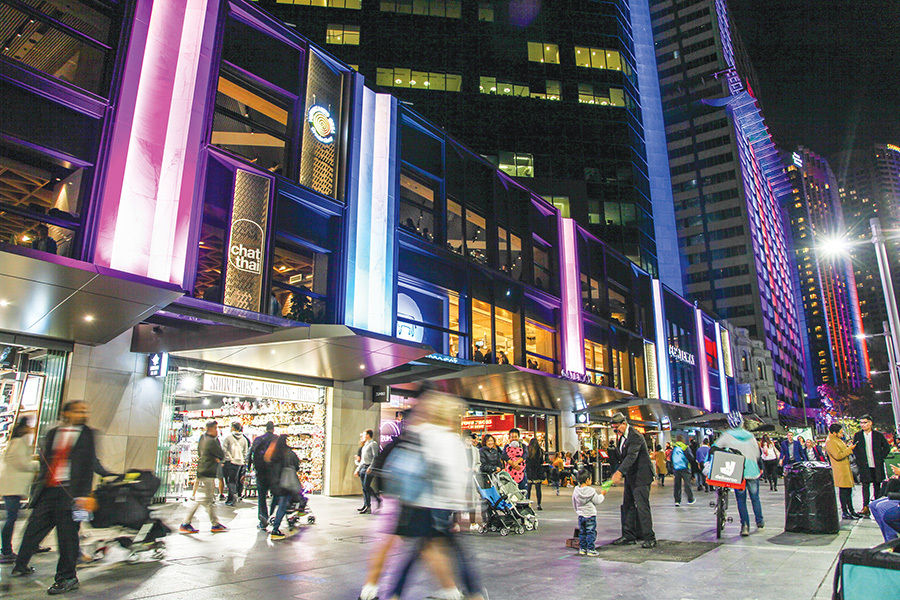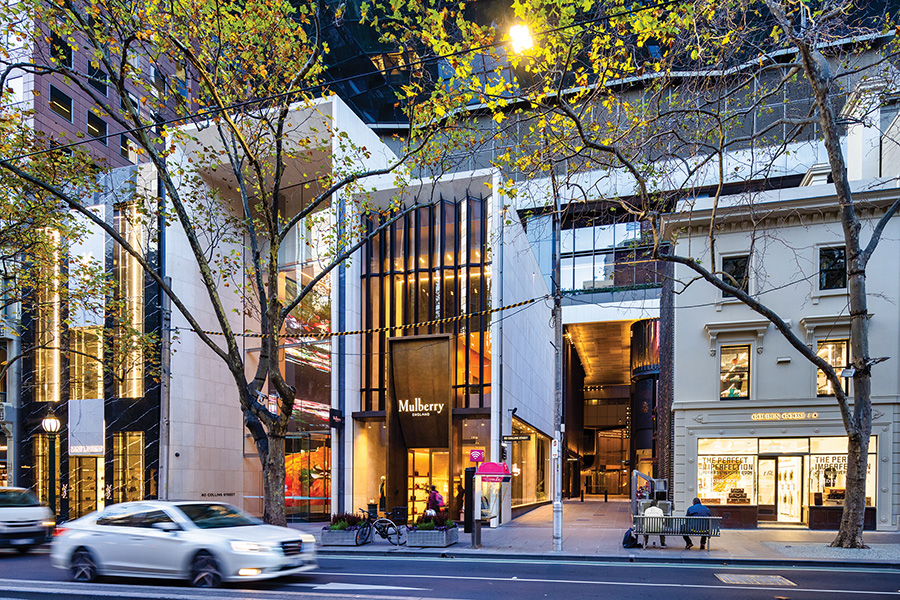Jonathan Forsyth, Asset Manager, Dexus – Nominee for the Frank Lowy Fellowship 2020.
The Frank Lowy Fellowship is an industry initiative of the Shopping Centre Council of Australia that is proudly supported by Scentre Group. Now in its sixth year, the fellowship was established in recognition of the contribution made by Sir Frank Lowy AC to the Australian shopping centre industry.
In this special feature (published in SCN‘s CBD Guns edition), we showcase the talent of past fellowship winners and nominees who have demonstrated excellence in their field and celebrate them as next-generation leaders, collaborators and innovative thinkers whom will ensure Australia’s shopping centre industry continues to be a world leader.
Jonathan implemented the installation of solar panelling at Beenleigh Marketplace in Brisbane, which has indicated 47% of the centre’s daily power can be supplied through these panels. He also managed the COVID-19 land tax relief initiative across Dexus’ wider retail business. This included ensuring all property assessments were completed and applications were submitted.
What do you love most about the shopping centre industry?
I love how dynamic the industry is. This ensures you are constantly learning and never get bored, especially if you work ‘on the ground’ in a centre where every day brings something different. There is also a greater requirement to think strategically with the diverse mix of stakeholders, which can be challenging at times, but provides a rewarding work experience. It’s exciting to watch the industry evolve and to set strategies that cater to these business disruptions and changing consumer demands.
How have you adapted to the changing retail landscape?
I believe the disruption brought on by COVID-19 has stressed the importance of being adaptable. The pace of adaptation is a factor of success. In a static environment, employees can be caught up in their ‘business as usual’ workload. However, with the constant change COVID-19 has brought during the past years – 27 iterations of commercial code legislation, health restrictions and remote working – I have had to learn to prioritise and address issues at a much faster rate.
Customer centric decision-making is another area that I have noticed become more prominent in the retail landscape. Today, the customer has the power and if you want to be successful, you need to have the right product in the right locations, with the experiences to complement. Businesses that don’t consider the customer at every opportunity will struggle. Customer centric decision-making that is embedded into business operations creates successful outcomes for the business and the customer.

Gateway, Sydney
How have you applied technology to deliver better outcomes for your business and customers?
With the retail team being the early business adopters of a new management and reporting platform at Dexus, I became a key resource for our centre teams when any issues with operating the new system arose. Pushing the benefits of the new platform to the centre teams and assisting them helped improve the financial forecasting and therefore the reporting accuracy for the business. This was recognised within the business and led to me managing the portfolio arrears reporting within Yardi. As part of this, I was responsible for building and presenting a monthly key portfolio report at leadership team meetings.
With the constant challenge to improve arrears reporting and add value to the business, I looked at the onset of COVID-19 as an opportunity to add further analysis and classifications into the reporting. I achieved this by linking data from other reports, which enabled the leasing team and centre managers to better understand the breakdown of the collectable debt, in particular the status of the retailer, and forecast COVID-19 Commercial Code assistance that may be applicable for the account.
This benefited the business and also our retailer customers by simplifying their total arrears position, which is important when having the difficult conversations.
As consumer preferences change, how can shopping centres adapt to stay relevant?
With the growth of online retail driven by convenience, retailer investment/development in their platforms and, more recently, the forced shift from lockdowns, it is clear shopping centres need to adapt to stay relevant. This was highlighted in SCN’s recent Big Guns cover story, which talked of Scentre Group evolving from a ‘shopping centre’ to a ‘living destination’. We will start to see this across the industry as landlords invest more in activations that enhance the experience for the customer. The industry will also continue to use richer data sets to identify what the customers need, tweaking their mix of activations accordingly.

80 Collins, Melbourne
What do you think will be the next phase of change in the Australian shopping centre industry?
Arguably, the pendulum has now swung in favour of the retailer. Retailers have greater control in leasing negotiations, particularly if they represent a strong brand for a centre’s retail mix, or the landlord hasn’t managed their expiry profile well and is carrying a large number of holdovers. The industry should prepare for this by providing as much value add to their retailer relationships as possible to help minimise the risk of additional vacancies or large rental reversions. The adoption of online retailing will also become more important going forward. It is clear to see that the retailers who have adapted to use a strong omni-channel strategy have achieved the most considerable growth.
There is a growing disparity in the online offer between the most advanced operators and those who have just started or not actually invested into this space at all.
Retailers and landlords need to work proactively together to ensure mutually sustainable outcomes are achieved to successfully compete with the rise of online retailing. Everything should be on the table to get the best outcome for the consumer. According to recent data from the ABS, it is estimated that only 3% of online retail sales in Australia comes from ‘Pure Play’ retailers. This means 97% of retail online spend is across omnichannel retailers. This is the opportunity for shopping centre owners and retailers.
This article forms part of a special feature published in SCN Magazine – view the full feature here.





















